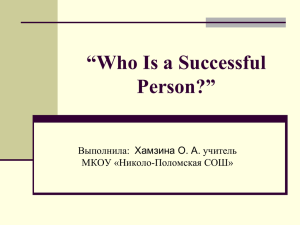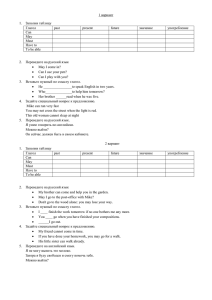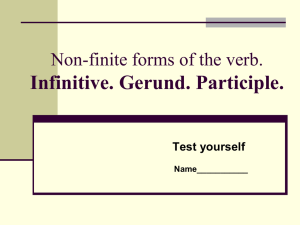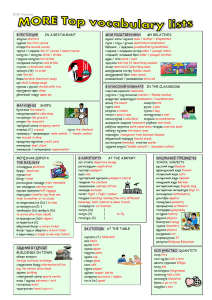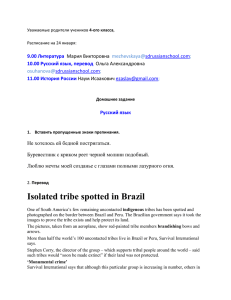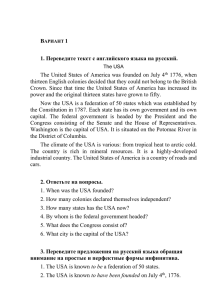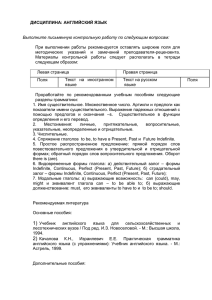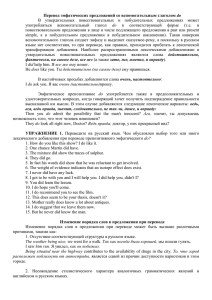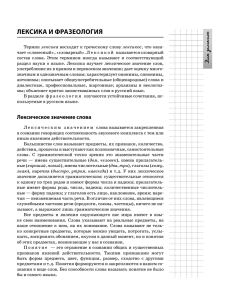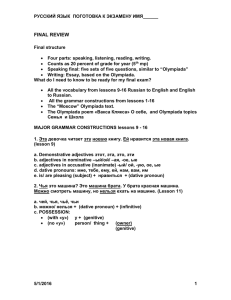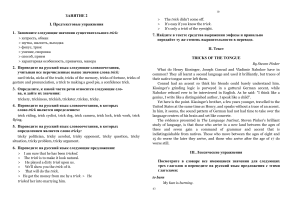Система упражнений и тренировочных тестов по
реклама
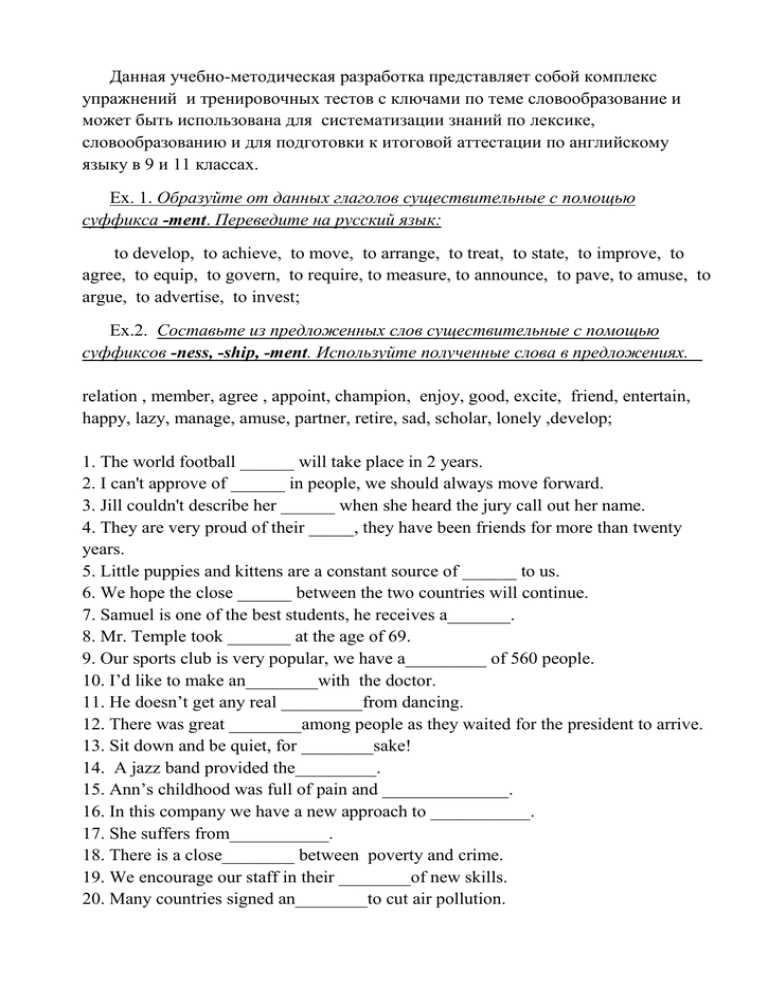
Данная учебно-методическая разработка представляет собой комплекс упражнений и тренировочных тестов с ключами по теме словообразование и может быть использована для систематизации знаний по лексике, словообразованию и для подготовки к итоговой аттестации по английскому языку в 9 и 11 классах. Ex. 1. Образуйте от данных глаголов существительные с помощью суффикса -ment. Переведите на русский язык: to develop, to achieve, to move, to arrange, to treat, to state, to improve, to agree, to equip, to govern, to require, to measure, to announce, to pave, to amuse, to argue, to advertise, to invest; Ex.2. Составьте из предложенных слов существительные с помощью суффиксов -ness, -ship, -ment. Используйте полученные слова в предложениях. relation , member, agree , appoint, champion, enjoy, good, excite, friend, entertain, happy, lazy, manage, amuse, partner, retire, sad, scholar, lonely ,develop; 1. The world football ______ will take place in 2 years. 2. I can't approve of ______ in people, we should always move forward. 3. Jill couldn't describe her ______ when she heard the jury call out her name. 4. They are very proud of their _____, they have been friends for more than twenty years. 5. Little puppies and kittens are a constant source of ______ to us. 6. We hope the close ______ between the two countries will continue. 7. Samuel is one of the best students, he receives a_______. 8. Mr. Temple took _______ at the age of 69. 9. Our sports club is very popular, we have a_________ of 560 people. 10. I’d like to make an________with the doctor. 11. He doesn’t get any real _________from dancing. 12. There was great ________among people as they waited for the president to arrive. 13. Sit down and be quiet, for ________sake! 14. A jazz band provided the_________. 15. Ann’s childhood was full of pain and ______________. 16. In this company we have a new approach to ___________. 17. She suffers from___________. 18. There is a close________ between poverty and crime. 19. We encourage our staff in their ________of new skills. 20. Many countries signed an________to cut air pollution. Ex. 3. Образуйте от данных глаголов существительные с помощью суффикса -еr или -or. Переведите на русский язык: to lead, to write, to investigate, to visit, to speak, to sleep, to act, to direct, to conduct, to drive, to fight, to report, to sing, to skate, to swim, to teach, to travel, to sail, to invent, to found, to compose, to run. Ex.4. Образуйте от данных слов существительные с помощью суффикса -ty. Переведите на русский язык: popular, national, creative, able, responsible, real, possible, poor; Ex. 5. Образуйте от данных слов существительные с помощью суффиксов -ist, -ism, -ian. Переведите на русский язык: special, social, art, capital, economy, international, piano, technic, mathematics, statistics, politics, music, electric, Russia, Hungary, Canada, India, library; Ex.6. Образуйте от данных глаголов существительные с помощью суффиксов –ance, -ence. Переведите на русский язык: to appear, to differ, to prefer, to occur, to attend, to enter, to maintain, to obey, to perform, to allow, to accept, to exist; Ex.7. Образуйте существительные от разных частей речи, используя суффиксы –hood , -ence, -ency, -ness, -al , -(er)y, -ment , -ism, -ity, -age Example : I decided this. It was my decision. 1. 2. 3. 4. 5. 6. 7. 8. 9. 10. Some people are lonely. Some people suffer from_________. Jill’s a socialist. She believes in__________. Hurray! We all agree. Hurray! We have come to an __________. When I was a child, I was very happy. In my ____________ I was very happy. Two children are absent. Who can explain their_________. Be more efficient. Improve your _________. Don’t be so curious. Control your _____________. They got married. I don’t know anything about their___________. Ann refused to help them. Her __________was final. Who discovered this? Who made this____________. Ex. 8. Образуйте глаголы с помощью суффикса – en. Переведие полученные глаголы на русский язык. red, soft, deep, short, dark, bright, weak, length, strong, broad, wide; Ex. 9. Образуйте прилагательные с помощью суффиксов -ful и -less, переведите их на русский язык: beauty, thank, hope, doubt, help, use, care, cheer, aim, shape, fruit, power, thought, harm, colour, success; Ex. 10. Образуйте прилагательные с помощью суффиксов -able, - ible. Переведите их на русский язык: change, prevent, vision, compare, desire, profit, read, comfort, bear, flex, fashion, forget, eat, drink. Ex.11. Образуйте прилагательные с помощью суффиксa -ous, Переведите их на русский язык: fame, nerve, danger, adventure, poison, marvel, courage, luxury, vary, ridicule, humour, industry; Ex.12. Образуйте прилагательные от существительных при помощи следующих суффиксов: -al, -ful, -ous, -у, -able, -ic, -less, -ish. reason, history, hope, doubt, care, aim, use, desire, success, heart, experiment, office, sun, danger, fame, electron, base, nature, cloud, rain, child, Scott, home; Ex. 13. Образуйте наречия с помощью суффикса -ly и переведите их: personal, first, part, quick, strong, short, silent, rapid, wide, extreme, cruel, kind, happy, beautiful, careful, angry, cheerful, usual, recent. Ex. 14. Образуйте прилагательные с помощью суффиксов - ous, -al, -ic, -ful , используйте полученные слова в предложениях athlete , centre, danger, drama, education, environment, experiment, harm ,poison , science, tradition, use; 1. It's very _______ for health to have a well -balanced diet and regular exercise. 2. Kilt is a ________ Scottish skirt made of tartan, a special material. 3. Smoking is ________ for health. 4. Some mushrooms can be _________. 5. Ronald goes in for sports, he is a tall and very ___________ man. 6. The laboratory carries out an important _____research.(science) 7. The writer described these_________ events in his last novel. 8. The students are involved in the ___________work (experiment) in the field of Physics. 9. Green house gases are __________ for the ozone layer. 10. I think the new ___________ programme will be very effective in schooling. 11. They lived in the _________part of the city. 12. Pollution is one of the most serious ____________problems. Ex. 15. Распределите следующие слова по их принадлежности к соответствующей части речи, выделите словообразующие приставки и суффиксы. harmful, movement, waterless, attraction, shortage, slowly, enclose, displace, keeper, passage, difference, industrial, assistant, freedom, ability, measurable, popularity, freedom, beginner, buyer, shortage, wisdom, conductor, specific, beautiful, reality, active, famous, classify, starter, shorten, weightless, flatness, simplify, impossible, reconstruct, helpful, misunderstand, poisonous, evidently, disagree, encourage, fashionable, extraordinary, unluckily, logical, significant, unhappy, logistic, organize, pressure, extremely, lengthen, demonstration, destruction, powerless, brotherhood, partnership, overcook, disorder, prehistoric, childish; nouns verbs adjective adverb movement enclose harmful slowly Ex 16. Выберите глагол с отрицательным значением и вставьте его в соответствующее предложение. Поставьте глаголы в нужную грамматическую форму. disapprove, dislike, unwrap, mislead, disagree, disqualify, disprove, untie, unload, disconnect, misbehave; Example : John is widely disliked in this neibourhood. 1. If a child___ ______it means that he behaves badly and annoys or upsets people. 2. There was no intention ________the public. 3. She strongly ______________ of cheating. 4. Some sportsmen _______________ after a blood test. 5. All children like _______________ parcels at Christmas time. 6. Teenagers and their parents often _____________. 7. They were sure he was lying but it was hard _________ his story. 8. He learnt _____his shoes. 9. It took them almost an hour _____________the things from the van. 10. My phone ______________ because I didn’t pay my last bill. Ex.17. Образуйте глаголы с отрицательным значением, используя префиксы -mis, -dis. Переведите полученные слова на русский язык. to understand, to approve, to appear, to satisfy, to lead, to connect, to organize, to obey, to behave, to appoint, to associate, to prove, to take; Ex.18. Образуйте прилагательные, используя префиксы –il, -im, -ir, -un, -dis Переведите полученные прилагательные на русский язык. comfortable, possible, legal, regular, honest, active, capable, fortunate, secure, correct, certain, valuable, reasonable, qualified, responsible, employed, effective, attractive, expensive, famous, informative, personal, polite, literate, similar, obedient, kind; Тренировочные тесты по словообразованию. I. Nearly 90% of ___________(Canada) live within 200 km of the border with the USA, which means that Canada contain vast expanses of____________(wild) to the North. The ________(relation) to its _____________(power) neighbour is a major defining factor for Canada. The US and Canada have the world’s largest_______(trade) relationship.The North American Trade__________(agree), involving Canada, the US and Mexico, has brought a trade boom for Canada. II. In the 1990s Franco-___________(Germany) _____________(cooperate) was __________(centre) to European __________(integrate). Ties saw a period of some strain at the _________(begin) of the new millennium as a result of ___________(different) over farm subsidies and the ________(policy) in the future of the EU. However, the two countries again proclaimed the bond between them in early 2003 when they celebrated the anniversary of a _________(war) ___________(friend) treaty. This bond further __________(strength) as they joined with Russia to voice __________(strength) opposition to the US-led war with Iraq. III. The first _________(impress) I got on arriving at my native village was the _______(hot) , that was ________(bear). The people who were waiting to meet at the railway station were all __________(friend). My grandfather looked like my father whose hair __________(recent) started to grey. The village itself which was a threehour journey from the railway station was ________(simple) stunning. IV. After the first day she complained that the weather was cold , living conditions were _______(terror) and the people were _________(friend). She wondered why it was always seemed to be _____________(darkness) and if the________(Britain) ever saw the sunshine. In her letter she says she feels_________(excite) to study drama at the university but she finds ________(society) life a bit __________(bore). She wrote that she had made some friends with some _____(Russia). We were ________(please) to hear this and wrote her that it was the best way of not feeling lonely. V. There is a lot __________(employ) nowadays so it’s getting more and more _________(difficulty) to get the job you _________(real) want. You have to make a _________(decide) what is more __________(importance) for you – good salary or job________(satisfy). VI. ________(teach) are finding it_________(increase) difficult to control classes of young pupils nowadays. The _________(evident) from the 100 schools which were involved in the study is not _________(encourage). Teachers feel ________(disappoint) not only by the student’s results but by the _________(worry) increase in the ____________(violence) __________(behave) in the class. VII. Athens is getting more and more _________( attract) to _________(tour). Although the city is big and _______( noise) visitors can still find a lot of quiet places with a ________(romance) atmosphere to enjoy a ________(taste) Greek meal and listen to _________(tradition) music. VIII. Language is a system of __________(communicate) that consists of sounds and _______(write) symbols. But we can also communicate in other ways by using ________(face) _______(express), our tone of voice and even our body. In many situations non-_________(verb) communication can reveal more _______(accurate) what person is feeling. IX. Since ancient times, people have practiced the art of physiognomy reading character from physical features. The ancient Greeks compared the human face to _________(vary) animals and birds, such as the eagle and the horse. They believed people shared certain character traits with the animals they resembled. The ___________(personality) with a horse-like face was thought to be _________(loyalty) , ____________(bravery). A person with an eagle-like nose was believed to be bold and ____________(courage). _______________(science) study such features as the shape of the head, the ________(long) and the ___________(thick) of the nose, mouth, eyes and chin. They believe that round-faced people are _____________(self-confidence). Prominent cheek- bones show the __________(strong) of character while a pointed nose reveals ___________(curious). Heavy, arched eyebrows belong to a ____________(decide) individual while thin, arched eyebrows signal a _____________( no rest) and _____________(act) ___________(person). Almond-shaped eyes belong to __________(dream). Down-turned lips reveal a ___________(pride) character while a long, pointed chin indicates someone who likes to give orders. X. It’s important to make a good________(impress) when going for a job interview. __________(interview) usually ask a __________(various) of questions, many of which concern_________(qualify). However, they also usually like to ask questions about previous ___________(occupy) as well as _____________(achieve) not connected to the work place. Often, the _________(success) candidate isn’t the one with the most__________(impress) _________(educate) but the one who shoes that he or she has made the most _______(effect) use of their time. Few employers want employees who are _______(able) to think for themselves. The_________(possible) of advancement in any job very ______(rare) depends on the __________(accurate) of work but more on the _______(enthusiastic) and ________(dedicate) of the __________(employ). Ключи к тренировочным тестам. I.Сanadians wildness relationship powerful trading agreement II. German cooperation central integration beginning differences political postwar friendship strengthened strong III.impression heat unbearable incredibly friendly recently simply IV.terrible unfriendly dark British excited social boring Russians Pleased V. unemployment difficult really decision important satisfaction VI.teachers increasingly evidence encouraging disappointed worrying violent behavior VII. attractive tourists noisy romantic tasty traditional VIII. communication written facial expressions verbal accurately IX. various person loyal brave courageous scientists length thickness decisive restless active personality dreamers proud X. impression interviewers variety qualifications occupations achievements successful impressive education effective unable possibility rarely accuracy enthusiasm dedication employee Литература. “Macmillan English Dictionary” M.Mann, S.Taylore-Knowles “Grammar and Vocabulary”. В.А. Миловидов “Английский язык, Полный справочник для подготовки к ЕГЭ”, Москва, “Астрель”, 2009
